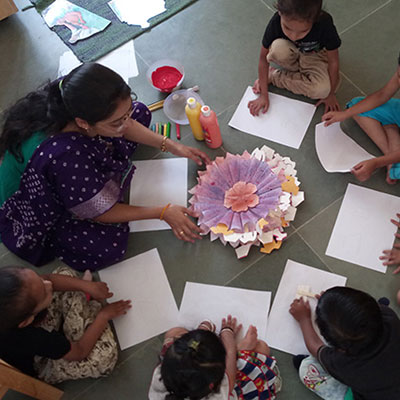

Parents as Partners
At the center parents, children and teachers are involved in the learning process. Parents play the most valuable role in the development of a child, and we encourage parents to be active contributors in the child's development.
The coeducational pre-school follows the AKES, I pioneered 'Shishu Pahel Paddhat (SPP),' which is now being replicated in over 200 schools across Africa, Central Asia and South Asia.
It is a well-researched methodology based on various international curricula and is contextualised to suit the local needs. SPP has now been institutionalised across the AKES network as part of the Early Childhood Development (ECD). The Shishu Pahel Paddhati emphasizes on "child initiated learning"; children are encouraged to plan and construct their own learning, thus retaining their natural self-confidence. It provides the child with opportunities for physical, emotional and social development. Through uniquely designed classrooms, the child experiences the joys of reading, expression, mathematics, music, movement, water and sand play, art and craft.
The focus of the curriculum is on "child-centered education". This involves dynamic interaction between the facilitator and students in curriculum design, classroom interactions, and the achieving of learning outcomes. The focus of the learning process is the child, the pace and content, being directed by the child with guidance and support by the facilitator. The education process using an integrated curriculum is supplemented by a variety of co-curricular activities including sports, field trips and project method. This interactive and integrated approach is based on the education philosophy that emphasizes that:
As children grow, the prime areas will help them to develop skills in 4 specific areas. These Specific Areas of Learning are:
Toddler program (18 months – 2 years age group)
The Toddler Programme provides early opportunities to promote children’s development with focus on sensory, motor and socio-emotional development. The objective of the programme is to provide developmentally appropriate play opportunities for children to explore and to support the parents to continue the same at home.
Pre-Nursery (For 2 to 3 years' age group)
Pre-nursery classes are offered to children of the age group between 2-3 years. They learn basic language and can communicate basic needs. These children also learn to recognize symbols, letters, and objects. Two to three year old are mainly pushed towards developing their pre-reading and pre-writing skills. Both, Gujarati and English, are used for instruction and communication with the students.
Hygiene needs are met and nutritious snacks are provided to all students at the center. The meals served are cooked in the same premises. Students are encouraged to be independent leaders.
Nursery (For 2 to 3 years' age group)
The nursery program is designed for children between the age group of 3-4 years. This program mainly focuses on the cognitive, language, social/emotional, and physical development of the child. Young children learn better when they can engage themselves with materials, people, and ideas, so we plan plenty of activities for better learning. We incorporate, both indoor and outdoor learning activities, which include theme-based activities.
We follow the Plan-Do-Review method, which is based on the High-Scope curriculum. We use both, Gujarati and English, as languages of instruction so that the children learn to appreciate their own culture, while preparing to be strong global citizens.
Preschool- Junior KG and Senior KG (For 3 to 6-year age group)
The foundational stages are strengthened with the help of literacy and numeracy activities. Every child has a different interest and ability, keeping that in mind, small and large group activities are planned and executed accordingly.
Parents are equally involved in the development of the child. Home activities are given and explained to the parents for faster and better revision for enhanced development.
At the center parents, children and teachers are involved in the learning process. Parents play the most valuable role in the development of a child, and we encourage parents to be active contributors in the child's development.

© Aga Khan Schools 2009 - All rights reserved
Terms & Conditions | Privacy Policy
The Aga Khan Schools are part of the Aga Khan Education Services,
an agency of the Aga Khan Development Network
© Aga Khan Schools 2009 - All rights reserved | Terms & Conditions | Privacy Policy
The Aga Khan Education Services are part of the Aga Khan Schools,
an agency of the Aga Khan Development Network.